

Creative Childcare provides the solid foundation needed for children to ensure that lifetime outcomes for the future wellbeing of children, both in the home and the community, are met.
School Readiness in Early Childhood. Understanding and Applying Positive Discipline at Home. For some reason, thinking about disciplining children involves thoughts of punishment and a lot of yelling.
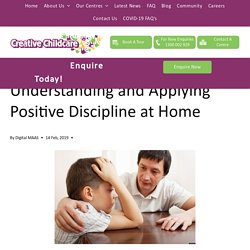
Positive discipline is an idea that deviates from what we have grown to associate discipline with and reinforces teaching instead of punishing. Techniques used in positive discipline are often instructive and caring, resulting in better retention and understanding. Here are some tips to help you apply positive discipline when speaking to your child: Use Encouraging Words Childcare centres in Australia often praise children for a job well done, regardless of the outcome or how simple the task is. Positive discipline involves teaching your children how they can handle mistakes. Work Together to Solve the Problem Working together is an effective way to deal with problems. When you see your child exhibiting behaviour problems, rather than call them out and punish them, call them to talk.
Use Problems as Learning Opportunities. Helping Toddlers Cope with Separation Anxiety. Saying goodbye to toddlers can be full of emotions, both for you and the child.
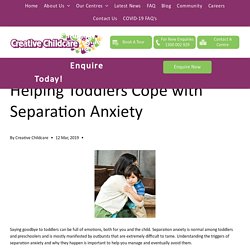
Separation anxiety is normal among toddlers and preschoolers and is mostly manifested by outbursts that are extremely difficult to tame. Understanding the triggers of separation anxiety and why they happen is important to help you manage and eventually avoid them. Why Does Separation Anxiety Happen? Children can experience feelings of separation anxiety for a variety of reasons but generally, it’s because they believe that their survival depends on having their primary caregiver with them at all times. They are also too young to understand how time works, even leaving them for a few minutes can feel like a long time for them. Separation anxiety can also signal your child’s increasing autonomy. Children Learning Creatively Through Art. The power of art: five ways artistic activities can support child development Art is much more than meets the eye.
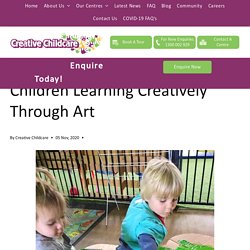
Drawing, modelling, painting, and building aren’t just fun ways to play — they’re essential learning tools that encourage children to explore, question, experiment, problem-solve, think, and create. Children Learning Through Music. Six reasons why music is essential in childcare. Why music matters: six reasons why music is essential in childcare Music is a fantastic learning tool for children, and one that they can benefit from at any age.
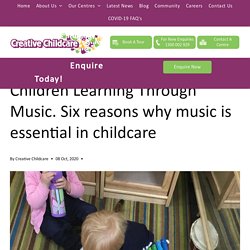
It helps strengthen several areas of development, from creativity to language, and can hone important motor and memory skills too. Consequently, it’s essential to routinely incorporate music into any learning environment wherever possible. Here are six reasons why music matters in childcare. How to Assess Your Child’s School Readiness. Creative Way to Prepare your Toddler for their First Day School.
Every parent may have a unique and personal way of raising their kids, but the one thing they all have in common is in the gentleness of the approach.
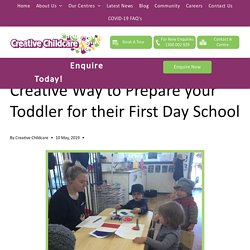
Parents don’t want to put their kids in stressful situations, and as such, try to provide them with everything they might need. However, this can become tricky once the child hits the school age. As early as the age of five, your child would be spending a large portion of their day at school. Understandably, this huge shift in their life can be quite a stressful experience. Helping Your Child Manage Stress and Changes. Children like routines, because they can take comfort in knowing what happens when it happens.
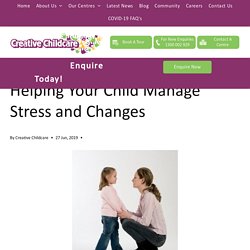
For children, having something steady to rely on like an everyday routine is important. Unfortunately, life doesn’t always stay the same. Children attend an early learning centre, people move houses and every year, they would likely meet a new teacher. 5 Helpful Tips for Teaching Responsibility to Your Toddler.
It's never too early to teach your toddler to be responsible.
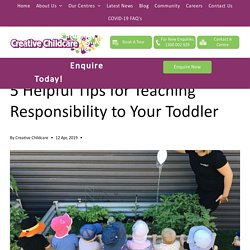
Responsibility is one of the most essential values to develop in a child and training your kids to be responsible, as part of child care in Australia, will help establish their independence, among other values, and will definitely serve them well in the larger world when they grow up. Here are some tips for starters. 1. Begin by Giving Age-Appropriate Tasks. Supporting Your Child’s Speech and Language Development. The Importance of Children Learning Creatively. Why Creativity Is Essential to Children's Learning Creativity is an essential element of any great learning program, especially for young children.
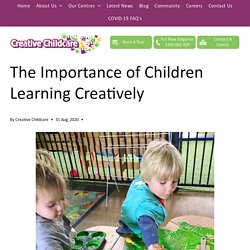
Though participating in creative activities helps children to develop both communication and motor skills from an early age, it can also have an enormous emotional impact. Learning programs that don't make creativity a top priority are depriving children of these key benefits. Encourages Self-Expression. Children and Technology: How Much Screen Time is Okay?
Technology nowadays is easily accessible, even for a small toddler.
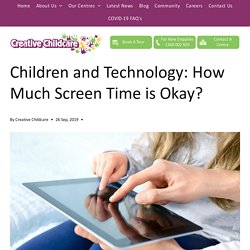
From watching cartoons on the TV to checking out online games and videos, your child is likely to be exposed to one form of media use as they are growing up. While this is normal, if you end up having to pry their gadgets away during meals, you have to change things. According to the American Academy of Pediatrics, too much screen time, the term used for the time that’s spent on games, devices and videos, can have a negative effect on your child’s sleep, health and social skills.
Understanding how this behaviour and technology affects their cognitive development is a key part of child care in Australia. Challenges in Children’s Play: Is it Worth the Risk? Playgrounds provide a safe environment for children to grow in confidence, abilities and self-esteem while honing their social and gross motor skills.
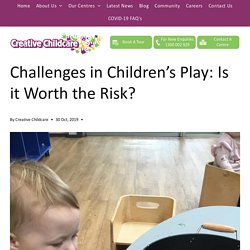
In fact, childcare centres in Australia often incorporate playtime into their educational plan. Most people, however, when looking back on their own childhoods, remember playtime riddled with challenges and risk that have helped shape them as individuals. As parents, if you’re wondering why children seek challenges and risks during play and if it’s okay to allow it, Creative Childcare explains further: Risky and Challenging Plays Early education centres implement learning opportunities during playtime through a variety of ways. Loose parts play - where children are provided with items like pipes, milk crates, wooden boxes and logsSupervised cooking - where children cook damper in fire pits while supervised by educators. The Benefits of Risky Play. The Importance of Art in a Child’s Early Learning Experience. While many parents view art as a hobby for children, it can actually be essential to a child’s early education.
Art helps support free play in children, allowing them unrestricted exploration and experimentation that are both fun and educational. Creative Childcare discusses the benefits of incorporating art in creative childcare in Australia. How Early Learning Centres Help Early Childhood Development. Benefits of Early Child Development Programs, Does Childcare Make a Difference to Children's Development? Children's development in their early years is critical.
Young children should be exposed to high-quality childhood development programs and social learning environments. These programs can help to develop vital and critical skills that will be used as the social and educational building blocks for the future. Other benefits of early childhood development programs include: Transition from childcare to school Transition From Childcare to School At Creative Childcare, we place a strong focus on ensuring that all of our children are presented with opportunities to practice life skills. Benefits of sending your children to a daycare centre. A majority of families need two incomes to meet their needs and live comfortably. Some parents have decided to create a comfortable home life so that all family members, including children, can thrive. Many parents may not be able to take care of their children while working. The solution is daycare services. Infants and babies aged between 6 months and four years have a lot to benefit from daycare services.
What should I look for in a daycare centre. A Typical Day at Creative Childcare Hunter Street. Children's Health & Nutrition